Publications from 2008-2013
The news in 140 characters

2009
The media has been fed up with little news that seems larger when broadcast to the general public. And in a very peculiar way, whoever makes the news properly turn into something necessary is the viewer himself. Sites like Twitter have shown, in their Trending Topics, or trending topics, news that once seemed futile to many. The death of a European singer can be commented on in Asia, although the fame of this singer is not so strong to reach the Asian continent musically.
The difference that Twitter represents in the mode of interaction with the news is what makes this become a current differential in the network. At a certain point, this may sound good, if we speak in terms of an even more judicious selection than the internet offers us. If you do not like a politician, send "@fulano I do not like you!". It is very probable that the demagogue does not realize in an adverse opinion, unless his name is part of the TT's. This Twitter sidebar survey shows everyone what they want. Or not.
What most users expect is that the invention of new web tools will never stop. While Orkut, Facebook, MySpace, and other social networking sites still seem enough for many, the search for novelty and greater public involvement in the media can still be better crafted and even more social. But one of the biggest challenges for the newscaster is whether it is in the public eye. These sites were and still are used to jot these points of view. Therefore, these opinions will be the news, and the general public may be their own informant. Would a new way of creating journalists begin?
The news always respects a pattern, at least up to the present moment. There is always interest in some particular news, such as murders and gossip, and all this is exploited by the media with praise. But many complain of violence in the same way that they exalt the victory of their team: as something that informs them, without a sense of the matter, although much of what you hear may be inflamed. The way this is put in a newspaper is very different from what most see on the computer. Even if the media themselves offer sites with spaces for opinion, a Twitter can generate lightning information that when arriving at the latest may be as changed as the fact itself. But unlike a means of communication, this can cause very different reactions, which may not be good.
How we deal with it can still be driven by new trends. And everything will depend on research in this field of information. But it is not hard to see that sooner or later, when we turn on the TV or open the newspapers, we will see arrows pointing to the computer, prompting that the answer to everything will be on the Web. Or rather, explaining in less than 140 characters, we will leave that most tell what is happening.




Nenhum comentário
Postar um comentário